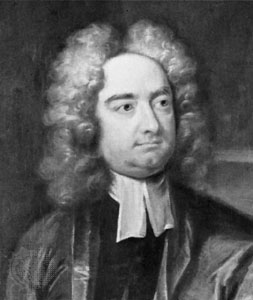
He was an Irishman who hated his own country and yet found himself condemned to spend most of his life there when he had nearly gained the valuable prizes that England offered — such was Swift's tragic situation. Yet as the cousin of the great John Dryden, the schoolfellow of William Congreve, brightest of society wits, and undefined relation of the powerful Temple family, he was well placed for advancement in an age when patronage was usually the only aid to merit.
Having entered the Church, chiefly for the splendid posts it could offer, he soon obtained a minor office at St. Patrick's Cathedral; but his views of the Whig party were too freely expressed in various pamphlets, and his chances of promotion from that quarter ended.
Therefore he threw in his lot with the Tories, came to London, and became the most active, virulent, arrogant and assertive of pamphleteers. He was the leading light of The Examiner, which might be termed the official party paper; he mixed with such outstanding Tories as Bolingbroke, Prior, Pope and Gay; he was largely responsible for moulding enlightened public opinion on the great political issues of the day. His reward was promotion to the Deanery of St. Patrick's. Obviously he could expect a bishopric, or even an archbishopric.
The death of Queen Anne and the uninterrupted domination of the Whigs ruined all his hopes. When he returned to his post in 1714, he knew that all his brilliant contacts would be seen only during intermittent visits, and that they, like him, could form nothing more than an unpopular opposition to the government.
Swift fell almost silent in his despair. Then the Scriblerus Club, a gathering of the most notable Tory wits and satirists, suggested a joint attack on Whig rule. Swift was seized by the possibilities of the scheme, and eventually he alone was responsible for the work— Gulliver's Travels—which, incidentally, was the only book to earn him money. It was issued in London and he neither saw nor corrected the proofs; it was not until 1735 that he was able to supervise an authoritative edition.
Swift had learnt much from Daniel Defoe in his use of convincing detail, brief but apparently well-founded references, statements so matter-of-fact that they sounded authentic, logically related strands of narrative, and the eye-witness attitude to events. But he was a profound scholar, a highly intelligent man, a leading wit among polished conversationalists and writers, a deadly propagandist. Thus he was able to write a pleasantly clear, fluent, almost casual language, which expressed precisely the bitterness of his satire.
"I have ever hated all nations, professions and communities; and all my love is towards individuals," he once wrote to explain the purpose of his book. Moreover, his aim was to prove "the falsity of that definition animal rationale (man is a reasoning creature) and to show it should only be rationis capax (man has the ability to reason). Upon this great foundation of misanthropy...the whole building of my Travels is erected."
Because he detested so many aspects of English life, Swift, despite himself, became the champion of Ireland, defending it against the tyranny and ignorance of a foreign government. He hated Britain and British politics; he hated Walpole and the Whigs; above all, he hated all who illustrated the folly, sham, stupidity and sheer brutality inherent in mankind. Like Fielding, he realized that a restrained ironic tone was best to display and emphasize the immensity of weaknesses and vices.
This is the tone of Gulliver's Travels. The first books had a wittiness and elegance that concealed yet strengthened the fury of his attack, and the satire is largely political; when he extended his survey to include numerous types of fools and scoundrels, and then the whole human race in its pretentiousness and animality, the mood grew darker; his melancholy, partly natural and partly the result of brooding discontent, cast a hideous air of hopelessness over his descriptions.
The account of the Flying Island is a fairly straightforward satire on the oppression of Ireland by England, and the state of that helpless land in the power of a foreign government. The Academy of Lagado is a thinly disguised slur on the Royal Society of Dublin, but it applies to all countries blinded by science. Scientific learning was greatly extended in the eighteenth century, but Swift felt nothing but disgust for the host of quacks, mad inventors, promoters of schemes for obtaining untold wealth, and arm-chair technicians whose projects so captivated a gullible public that they brought about a financial panic of which the South Sea Bubble was part.
One might have expected Gulliver's Travels to mark the beginning of a brilliant period in Swift's life; in fact, it was virtually the end of his effective career. The trips to London ceased; to add to his misery, he lost the companionship of Esther and Stella, two ladies whose sympathy had kept some light-heartedness in him during the years of despondency.
Swift's brain was long clouded, and eventually insanity overcame him. One may say that he exemplified the irony he could so well employ — his life was longer than that of any other author mentioned in this book, and yet it was never used to the best advantage, and many of its later years were wasted in the obscurity of mental weakness.